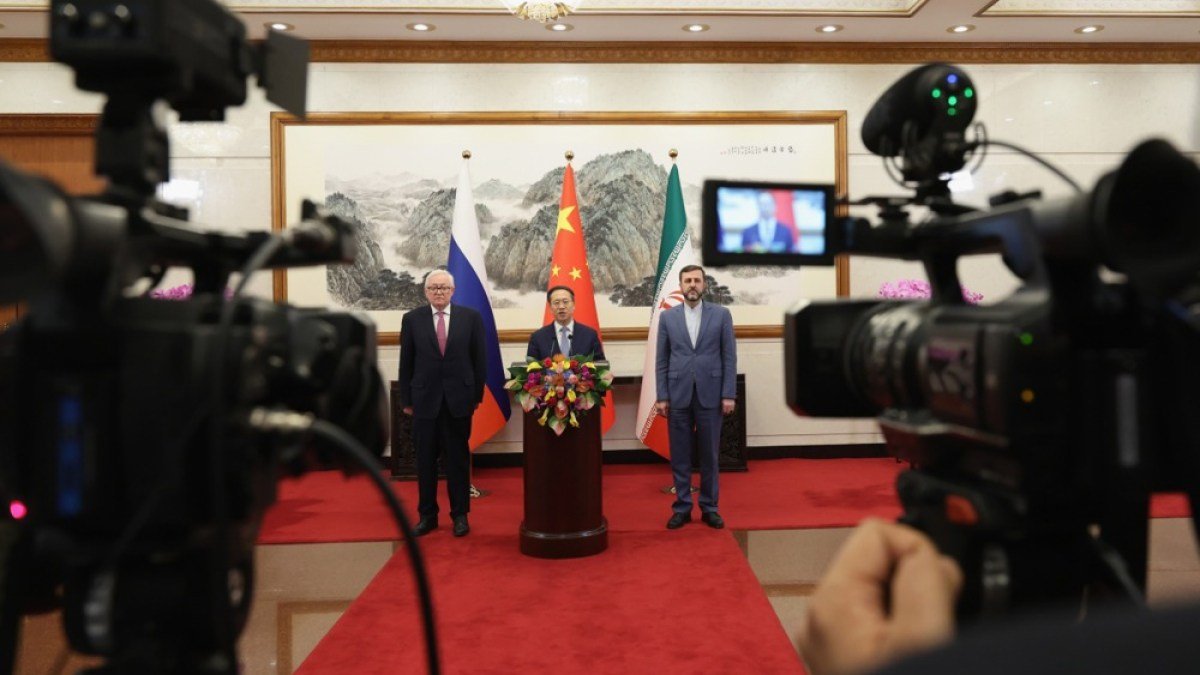Deputy foreign ministers of Russia, China and Iran call for multilateral talks on ending ‘unlawful’ US sanctions.
Representatives of news/2025/3/14/iran-russia-china-discuss-tehrans-nuclear-programme-at-beijing-meeting”>Iran, Russia and China have urged United States President Donald Trump’s administration to end sanctions imposed against Tehran over its rapidly advancing nuclear programme, while calling for the resumption of the multilateral talks on the issue.
The three nations “emphasised the necessity of terminating all unlawful unilateral sanctions”, China’s Vice Foreign Minister Ma Zhaoxu read from a joint statement issued on Friday. He was flanked by his counterparts from Russia, Ryabkov Sergey Alexeevich, and Iran, Kazem Gharibabadi.
“The relevant parties should work to eliminate the root causes of the current situation and abandon sanctions, pressure and threats of the use of force,” Ma said.
Iran’s Gharibabadi praised the meeting as “very constructive and positive”, even as he accused “some countries” of creating “an unnecessary crisis” to thwart Tehran.
Later on Friday, Chinese Foreign Minister Wang Yi was due to meet with the three senior diplomats.
The talks are the latest attempt to resolve the Iran impasse, as Trump tries to reach out to its Supreme Leader Ayatollah Ali Khamenei in an attempt to jumpstart talks.
Any progress on the Iran talks with the Trump administration requires the support of Russia and China, which are both permanent members of the United Nations Security Council alongside the US, France and Britain.
The approval of the Security Council paved the way for the implementation of the 2015 Iran nuclear deal, which news/2018/5/8/donald-trump-declares-us-withdrawal-from-iran-nuclear-deal”>Trump abandoned in 2018 during his first term as president, setting in motion years of attacks and tensions in the wider Middle East.
Under the original 2015 nuclear deal, Iran was allowed to enrich uranium only up to 3.67 percent purity and to maintain a uranium stockpile of 300 kilogrammes (661 pounds). The last report by the International Atomic Energy Agency (IAEA) on Iran’s programme put its stockpile at 8,294.4kg (18,286 pounds) as it enriches a fraction of it to 60 percent purity.
Iran insists its nuclear programme is peaceful.
While Iran has maintained it would not negotiate under threat, its economy has been savaged by the US sanctions. Protests over women’s rights, the economy and Iran’s theocracy in recent years have shaken its government.
Last Friday, Trump said he had sent a letter to Khamenei, urging negotiations but also warning of possible military action.
In response, Khamenei mocked the US president saying he was not interested in talks with a “bullying government”. He complained that Tehran “negotiated for years, reached a complete and signed agreement”, and Trump “tore it up”.
Iranian President Masoud Pezeshkian also said that he would not negotiate with the US while being “threatened”, and Iran would not bow to US “orders” to talk. But he had previously said in a speech to the UN that Tehran was “ready to engage”.
Other Iranian officials have offered some signals over the possibility of negotiations, and the latest meeting in Beijing could indicate its openness for new talks.



